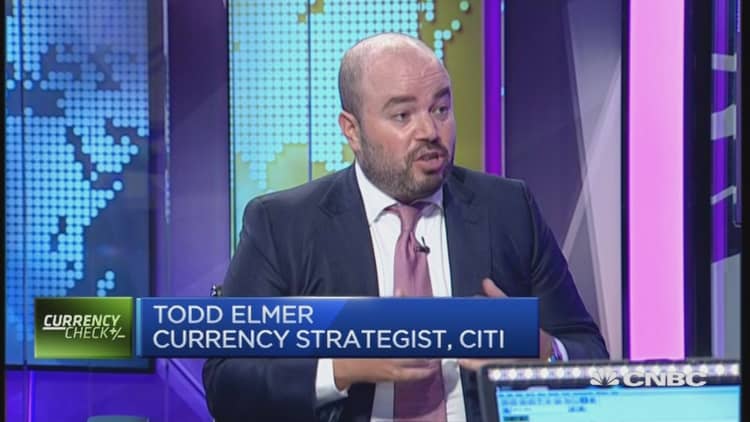
The dollar surged in the wake of U.S. missile strikes on Syria on Friday, but analysts were divided on whether the greenback would keep flexing its muscles.
In a move that took many by surprise, the Trump administration used Tomahawk cruise missiles to attack a Syrian government airfield late Thursday U.S. time. It has also continued to fly sorties over Syrian airspace.
Additionally, the U.S. moved an aircraft carrier group closer to North Korea over the weekend.
That sent additional flows into the U.S. dollar, which is often considered a safe haven. The , which measures the greenback against a basket of currencies, rose to as high as 101.34 in early Asia trade on Monday from around 100.50 before the U.S. struck Syria.
The dollar climbed against a slew of currencies, including the British pound, the , the Australian dollar and the yen.
Todd Elmer, a currency strategist at Citi, told CNBC's "Street Signs" on Monday that he expected the strength of the dollar and other safe-haven currencies, such as the yen, would persist amid the escalation in geopolitical tensions.
"It's obvious that the immediate response to the U.S. strikes in Syria has started to wane somewhat, but I do think there will be a bit of an aftertaste in terms of the market paying a bit more attention to geopolitics," Elmer said. "This is going to raise questions in investors' minds as to whether this will provoke more tensions with Syria's allies, Russian and Iran, and whether or not they should extrapolate this use of military action to other conflicts such as with North Korea."
Elmer also noted that the greenback's muscle flexing wasn't just about geopolitics, with the U.S. Federal Reserve also appearing to lean toward hawkish.
In Fed minutes released last week, the U.S. central bank indicated it would begin to unwind the $4.5 trillion in bonds it's holding on its balance sheet and that it was likely on a faster trajectory for interest rate hikes.
Others were less certain the greenback would continue to track higher, at least not across the board.

Joseph Capurso, a currency strategist at Commonwealth Bank of Australia, told CNBC's "Squawk Box" on Monday that the dollar was buffeted by two trends: weakness against currencies of countries with current account surpluses, such as Japan's yen and the euro, and strength against commodity currencies.
"While you've got these issues with Syria, and potentially North Korea coming up, I could see those [current account surplus] currencies outperform," he said. "And of course you've commodity prices like the iron ore and coal and dairy, and they're pushing the Aussie and the down."
But some were generally bearish on the dollar.
David Riedel, president of Riedel Research Group, told CNBC's "Squawk Box" on Monday that fading expectations for U.S. President Donald Trump's domestic policies would likely take the sting out of dollar strength.

"I think Trump's failure to get health care passed really puts his tax reform efforts in some sort of question. It really questions his ability to do any of his platform that he was talking about on the campaign trail," Riedel said.
Last month, Trump failed to usher a Republican health-care reform bill through a seemingly friendly Congress in a development some analysts labelled a "fiasco," broadly raising doubts about the administration.
Expectations that a Trump administration would boost infrastructure spending and reform tax policies had been at least partially responsible for the recent market rallies.
"That Trump rally that attracted strength in the U.S. dollar as well as U.S. equities I think could fade somewhat," Riedel said.
—Nyshka Chandran contributed to this article.
—By CNBC.Com's Leslie Shaffer; Follow her on Twitter @LeslieShaffer1


